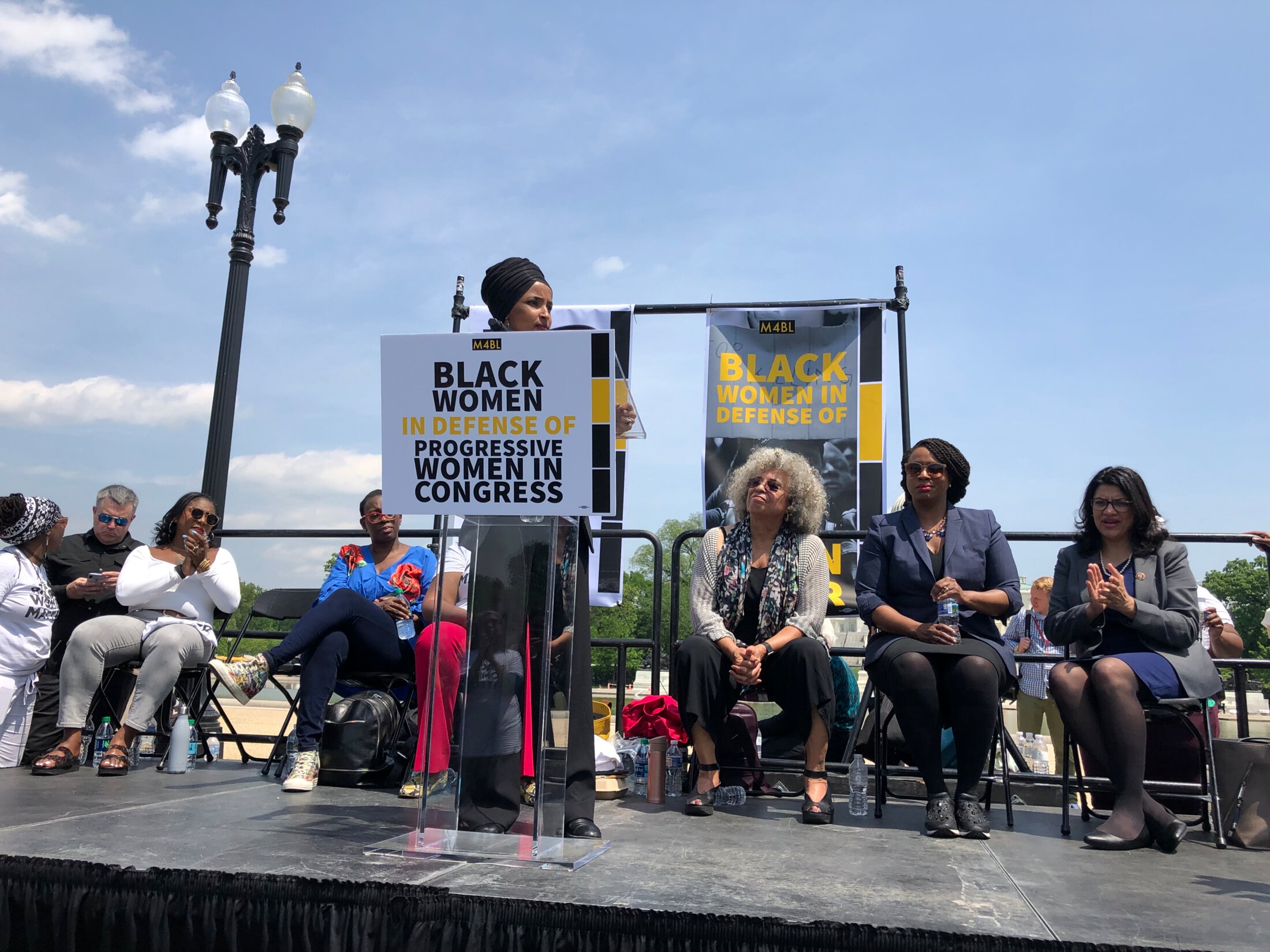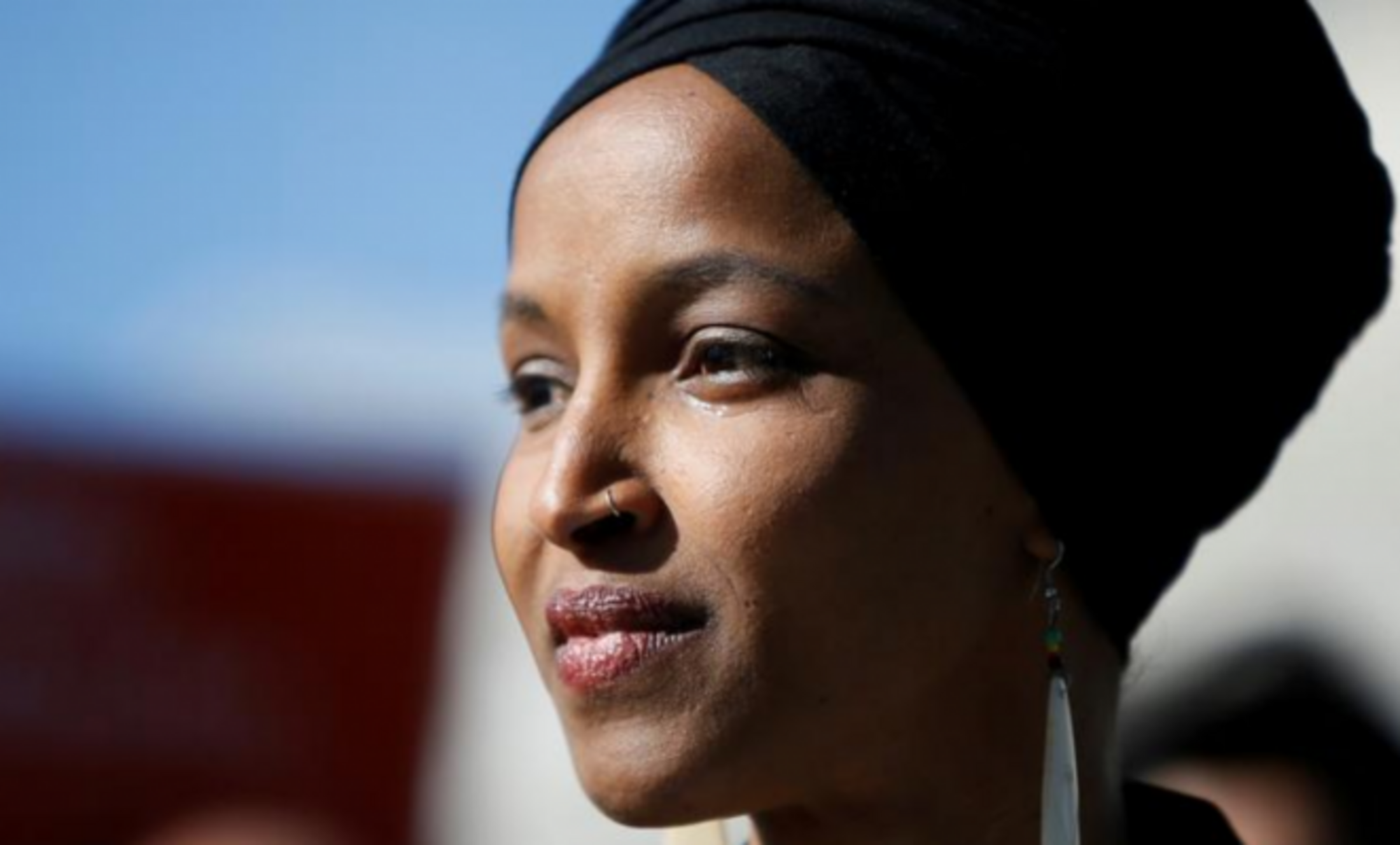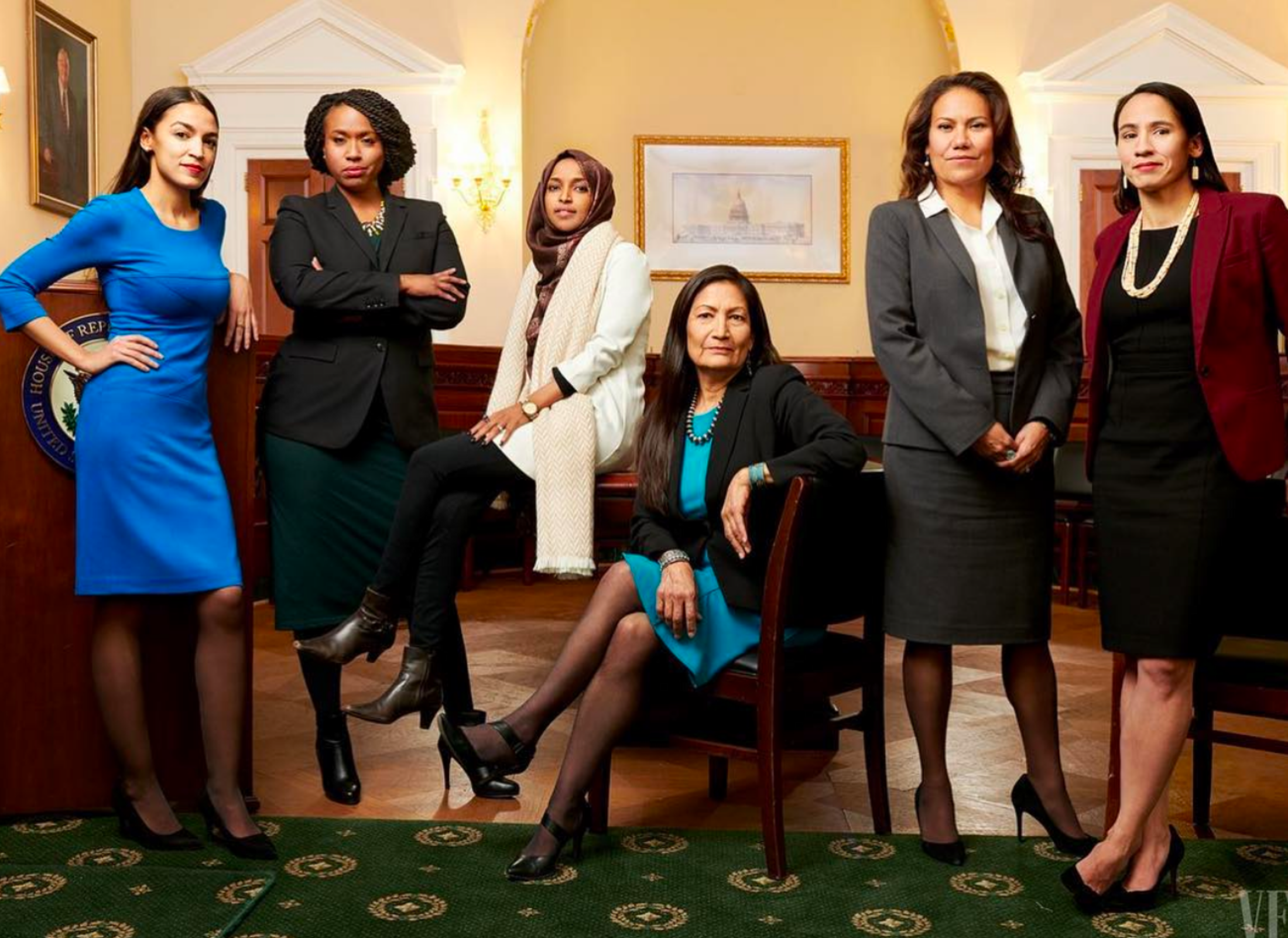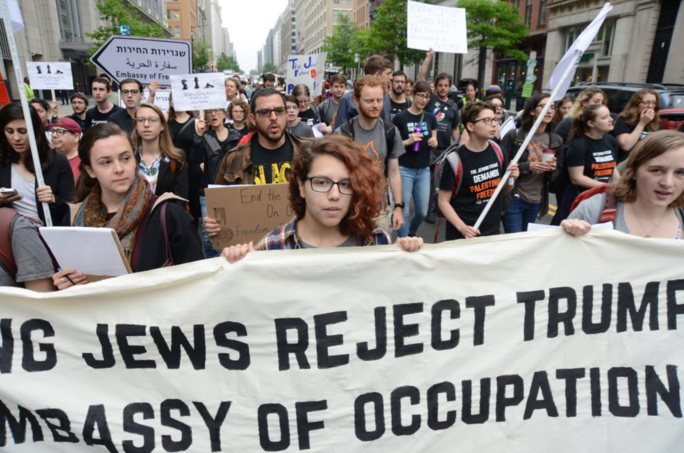There were chants of “we love you” as women black rights activists and several members of Congress held a rally at the foot of the Capitol Building in Washington, DC on April 30th, gathering there in support of Congresswoman Ilhan Omar.
Omar, who won a Minnesota seat for the Democrats in the House of Representatives last November, was moved to tears, patting her heart and holding hands with Alicia Garza, cofounder in 2013 of the Black Lives Matter movement. Taking the microphone, Ayanna Pressley, the first black woman elected to Congress from the state of Massachusetts, shouted, "Hands Off Ilhan! I love you my sister”.
Over the past few months, Ilhan Omar, a black Muslim 37-year-old mother of three who gained US nationality after arriving in the country from Somalia as a child refugee, the first Somali-American elected to Congress, has become the choice target of President Donald Trump – who has called for her resignation – and his allies.
She has found herself at the heart of political controversy, accused of anti-Semitism by Republicans, and also a number of Democrats, following three separate messages she posted on Twitter and for which she has since apologised. Amid the furore, she has received death threats, ranging from one man (subsequently arrested) who allegedly called her office threatening to shoot her, to anonymous messages like the graffiti scrawled in the toilets of a Minnesota petrol station calling for her assassination.
Omar, the first Congresswoman to wear a hijab, a supporter of the controversial Boycott, Divestment and Sanctions (BDS) movement against Israel, is hated by the Right, criticised by numerous liberals, but is also vigorously defended by others on the Left. She has stirred emotions with her attacks on US “bullying” tactics in the Venezuela crisis, with her outspoken solidarity for the Palestinian cause and against what she has called an “apartheid” in the Middle East, and also for her progressist policy propositions.
Like her fellow Congresswoman Alexandria Ocasio-Cortez, another outspoken young Democrat and Representative for a New York district, she campaigns in favour (see her website) of the policies proposed by Democrat leftwinger Bernie Sanders during the last presidential elections, such as universal social security protection (“Medicare for All”), a minimum hourly wage of 15 dollars, fee-free university studies and the annulment of student debts, federal financing of housing, a New Deal for tackling environmental issues, an end to privately run prisons, and for the promotion of LGBT rights.
Dania Rajendra, a New-York based leftwing feminist activist who sits on the board of Jews for Racial and Economic Justice, says the criticism of Omar’s position “is as much about [her] domestic political commitments – Medicare for All, Green New Deal, and so on – as anything having to do with Israel and Palestine.”

Enlargement : Illustration 1

Also present at the April 30th rally in DC was Angela Davis, 75, the veteran black rights campaigner and icon for the American radical-left. “We stand up against the logic of scapegoating which emanates from the White House, replacing the political discourse with mystification and obscuration,” she told the gathering. “If one person or a few people engage in – or are accused of engaging in – a crime, the entire community is rendered culpable. This is the logic of lynching. If you can’t find one, get another.”
When Ilhan Omar took to the stand, thanking Davis who she said was one of her “idols”, she wiped her eyes. “I am very emotional, I refuse to cry, I always say that nobody really deserves my tears or any of my sisters’ tears, but you all moved me to tears with your love,” she said. “A sister of mine on TV said the thing that upsets the occupant of the White House, his goons in the Republican Party, many of our colleagues in the Democratic Party, is that they cannot stand that a refugee, a black woman, an immigrant, a Muslim, shows up in Congress thinking she’s equal to them. But I say to them, how else did you expect me to show up?”
“I tell people every single day, I have the same certificate of election than everyone else in the offices in Congress. But I got more people who voted for me than 428 of them! When they say who do you think she is: I am the one who people sent to the Congress. When this occupant of the White House choses to attack me, we know that this attack is not for Omar. This attack is the continuation of the attacks levelled against women, against people of colour, immigrants, refugees, and certainly against Muslims.”
“When we are talking about anti-Semitism, we must also speak about Islamophobia, it’s the two sides of the same coin of bigotry.”
On Saturday April 27th, just three days before the rally, a 19-year-old man who earlier posted a virulent anti-Semitic message on the online forum 8chan attacked a synagogue in Poway, close to the Californian city of San Diego, during Passover celebrations, shooting dead one man and wounding several other people. The toll of the attack, which came six months after a shooting massacre at a Pittsburgh synagogue which left 11 people dead, could have been much worse had the assailant’s assault rifle not jammed.

Enlargement : Illustration 2

Omar underlined that the same man who carried out the Poway attack is also accused of setting fire to a mosque in nearby Escondido in March. “So I can't ever speak of Islamophobia and fight for Muslims if I am not willing to fight against anti-Semitism,” she said.
While Omar condemned the attack on the California synagogue, Republican Senator for Texas and self-styled defender of Christian values Ted Cruz took to Twitter to attack her and the “anti-Semitic Left” which he said was “getting worse”. Omar gave him a blistering reply: “A white nationalist literally terrorized a synagogue during Passover yesterday and you have yet to say anything. Shame on you.”
For the American Right, many of whom support Israeli nationalist policies, Omar has become an obsession. Liz Cheney, Republican Representative for Wyoming, speaking in March after the House approved a resolution condemning bigotry, said that Omar “embodies a vile, hate-filled, anti-Semitic, anti-Israel bigotry”.
'It's all about the Benjamins, baby'
In interviews she has given since her election to the House of Representatives on November 6th 2018, Omar has said she has for a long time become used to being considered a “threat” because of being black and Muslim. “I don’t have a way of making myself less threatening as a black person, as a black woman, as a Muslim person, she told The New Yorker in an interview published in March. “And so it is just living with the reality that there are people who will see you as a threat. And figuring out how do you not allow that to deter the work that you have to get done.”
Speaking at the April 30th rally in Washington DC, she elaborated on that: “I am a survivor of war,” she told her supporters. “If I have survived the militia I can certainly survive these people.”
Ilhan Abdullahi Omar was born on October 4th 1981, the youngest of seven children of well-off parents in the Somali capital of Mogadishu. She was brought up by her father (her mother died when she was an infant) and a liberal-thinking grandfather. When the civil war broke out in Somalia, the family fled to Kenya, where she spent four years in a refugee camp. “My earliest memories, any unhappy memories that I have, are deeply rooted in feeling extremely tuned in to the noise of the mortar falling – the noise that it makes as it takes off and the noise that it makes when it is landing close to you,” she told The New Yorker. In a video interview with Yahoo News, she spoke of happier childhood memories , of a pleasantly chaos home that was an “open house”.
After the family subsequently arrived in the United States in 1992, they eventually settled in the city of Minneapolis, in Minnesota, home to the largest Somalian community in the US. “I was a teenager when 9/11 happened and I really was uncomfortable with many members of my community feeling like they had to strip themselves of their identity in order to mitigate the violence and the fears that they were feeling,” she told Yahoo News. “I thought the best thing that I could do was to make sure that I was visually showing up in every aspect of society as a visible Muslim, so that people can start to associate positive interactions with Muslims.”
“When I was younger I grew up in a very secular Somalia where it was almost a crime to wear a hijab, and when I came to the United States I would wear it once in a while, and the bullying I got around my hijab almost did not make any sense because most of the identities that I [felt as a] sense a pride were now a sense of tension. I was blessed to have a father who made me understand that there was nothing wrong with how I chose to show up in society.”
After graduating from North Dakota State University, Omar worked as a nutrition educator, while also engaging in political activities. In November 2016, on the same night when Donald Trump was elected as president, Omar was elected as a representative in the Minnesota House (local parliament). Earlier that summer she had won the Democrat primaries for the seat, beating two other candidates who included the incumbent, Phyllis Kahn, ousted after 44 years in the job.
In June 2018, she won the hard-fought Democrat primaries to run as the party’s candidate for the US House of Representatives in a solidly leftwing Minnesota district, which had been represented for more than a decade by Keith Ellison, the first Muslim member of Congress, who had stood down to successfully run for the post of Minnesota Attorney General.

Enlargement : Illustration 3

On November 6th 2018 Omar was elected as Representative for Minnesota’s 5th congressional district, beating her Republican opponent and garnering a 78% share of the vote. “Ilhan is an elected official who got to her post because of movements,” commented Miski Noor, a fellow Somali-American, an activist with the Minneapolis-based Black Visions Collective, associated with the Black Lives Matter movement.
Omar’s election to the House of Representatives coincided with that of fellow Democrat Rashida Tlaib, the daughter of Palestinian immigrants who was elected in Michigan, the two of them becoming the first Muslim women in Congress. They have, since, also become the targets of unbridled Islamophobia.
The hardright was outraged when the Democrat majority in the House amended its regulations, dating from 1837, that prohibited the wearing of head dress during sessions, allowing for the wearing of the hijab, the Jewish kippah and the Sikh turban. The reform came into effect in time for Omar’s signing-in in January.
Fox News host and Trump ally Jeanine Pirro launched an attack on Omar in her show ‘Justice’ aired in March. “Think about it,” said Pirro, “Omar wears a hijab. Is her adherence to this Islamic doctrine indicative of her adherence to Sharia law, which in itself is antithetical to the United States Constitution?" The outburst prompted Fox to issue a statement saying: "We strongly condemn Jeanine Pirro's comments about Rep. Ilhan Omar. "They do not reflect those of the network and we have addressed the matter with her directly."
At an event sponsored by the Republicans outside the West Virginia House of Delegates (local parliament), Omar featured on a poster, among other anti-Muslim flyers, depicting her alongside an image of the burning World Trade Center during the September 11th 2001 terrorist attacks. She has been the subject of countless rumours, such as that she married her brother, supported terrorist groups, or applauded the fire that swept through Notre-Dame cathedral in Paris in April. These and others have been discredited by the fact-checking website Snopes.
But Omar herself has provided Donald Trump and his allies political ammunition on a plate with her controversial Twitter posts that have fuelled three months of controversy. Shortly after arriving in Congress, Omar apologised for a message she had tweeted in November 2012, at the height of violent clashes during an Israeli offensive in the Gaza Strip, and which has since been deleted. “Israel has hypnotized the world, “she wrote, “may Allah awaken the people and help them see the evil doings of Israel.” Questioned about the tweet in an interview with CNN in January this year, Omar said: “I do not know how my comments would be offensive to Jewish Americans […] My comments precisely are addressing what was happening during the Gaza war, and I am clearly speaking about the way the Israeli regime was conducting itself in that war.”
On January 22nd, as the row over her 2012 comments ecalated, she tweeted: “That statement came in the context of the Gaza War. It’s now apparent to me that I spent lots of energy putting my 2012 tweet in context and little energy in disavowing the anti-Semitic trope I unknowingly used, which is unfortunate and offensive.” That was followed by another message that read: “With that said, it is important to distinguish between criticizing a military action by a government and attacking a particular people of faith. I will not shy away of criticism of any government when I see injustice —whether it be Saudi Arabia, Somalia, even our own government!”
Then, on February 10th, commenting on US support of Israel, she tweeted, “It's all about the Benjamins, baby”, in a reference to the 100-dollar bill that features an image of Benjamin Franklin, borrowing her phrase from the title of a Puff Daddy song. Questioned by a journalist who it was that she believed was “paying American politicians to be pro-Israel”, Omar replied, “AIPAC,” referring to the powerful pro-Israel lobby group, the American Israeli Public Affairs Committee, which is aligned with the Israeli hardright.
The comments caused fresh outrage. For some she was using anti-Semitic tropes, for others she was raising the caricatures that US support for Israel, a pillar of its foreign policy, was down to a simple matter of material interests. Democrat leaders of the House, including speaker Nancy Pelosi, called on Omar to “immediately apologise” for the “hurtful comments”.
The following day Omar “unequivocally” apologised and removed her tweet. “Anti-Semitism is real, and I am grateful for Jewish allies and colleagues who are educating me on the painful history of anti-Semitic tropes,” she said in a new message on Twitter. “My intention is never to offend my constituents or Jewish Americans as a whole. We have to be always willing to step back and think through criticism, just as I expect people to hear me when others attack me for my identity. This is why I unequivocally apologise.”
Fox News: 'You have to wonder if she's an American first'
But things escalated further. On February 28th, at a meeting in a Washington café, Omar again spoke out against the “political influence” of the AIPAC, which campaigns, as she put it, for an allegiance to a foreign country. Her comments again caused controversy, her critics denouncing what the Anti-Defamation League, a US-based international non-governmental Jewish organisation set up in 1913 to combat anti-Semitism, describes as the “dual loyalty” charge “used to harass, marginalize, and persecute the Jewish people for centuries” and which alleges that “Jews should be suspected of being disloyal neighbours or citizens because their true allegiance is to their co-religionists around the world or to a secret and immoral Jewish agenda”.
Democrat leaders in the House of Representatives planned tabling a resolution condemning anti-Semitic discourse, and which, under pressure from their own camp, became a resolution against "anti-Semitism, Islamophobia, racism and other forms of bigotry".
Then, on March 23rd, as Donald Trump began openly targeting Omar, she addressed a meeting in Los Angeles of the Council on American-Islamic Relations, CAIR, a Washington-based Muslim civil rights and lobbying group. “For far too long we have lived with the discomfort of being a second-class citizen,” she told the meeting. “Frankly, I’m tired of it. And every single Muslim in this country should be tired of it. CAIR was founded after 9/11 because they recognized that some people did something and that all of us were starting to lose access to our civil liberties.”

Enlargement : Illustration 4

Trump afterwards published on Twitter a patriotic video of the September 11th 2001 terrorist attacks on The World Trade Center, intercut with Omar’s comments. “WE WILL NEVER FORGET”, proclaimed Trump, in capital letters. On the Fox News daily morning programme, ‘Fox & Friends’, apparently the US president's favourite TV programme, its host Brian Kilmeade commented, “You have to wonder if she's an American first”.

Enlargement : Illustration 5

Meanwhile, the New York Post, the tabloid owned by media magnate Ruper Murdoch, close to Trump, (and whose News Corp group also owns Fox News and The Wall Street Journal) headlined, “Here’s your something” to a photo of the World Trade Center in flames, with the line: “2,977 people dead by terrorism”.
The president’s open attack on Omar opened the floodgates of hate, and while the Democrats in Congress delayed their reaction she was denounced and threatened to the point where the US Capitol Police and the House’s sergeant at arms began, in the words on Nancy Pelsoi, “conducting a security assessment to safeguard Congresswoman Omar, her family and her staff”. Alexandria Ocasio-Cortez took to Twitter to announce that, “Members of Congress have a duty to respond to the President’s explicit attack today. @IlhanMN’s life is in danger. For our colleagues to be silent is to be complicit in the outright, dangerous targeting of a member of Congress. We must speak out.”
On April 14th, Omar took to Twitter. “Since the President’s tweet, I have experienced an increase in direct threats on my life, many directly referencing or replying to the President’s video,” she wrote. “I thank the Capitol police, the FBI, the House Sergeant at Arms, and the Speaker of the House for their attention to these threats. Violent crimes and other acts of hate by right-wing extremists and white nationalists are on the rise in this country and around the world. We can no longer ignore that they are being encouraged by the occupant of the highest office in the land […] Violent rhetoric and all forms of hate speech have no place in our society, much less from our country’s Commander in Chief. We are all Americans. This is endangering lives. It has to stop.”
The following day, around 150 leftwing activists published a statement in support of Omar, entitled ‘We, the undersigned, stand in solidarity with Representative Ilhan Omar and firmly against the rise of Islamophobic attacks and attempts to divide us as a people”.
“She’s targeted because she’s an independent voice, because she’s black, Muslim, a refugee,” said Maurice Mitchell of the Brooklyn-based Working Families Party, which co-signed the statement. “What she’s saying, if folks would listen, about foreign policy is very courageous and necessary.”
Most of the Democrat candidates for the next presidential elections joined the fray, including Elizabeth Warren, Bernie Sanders, Beto O’Rourke, Pete Buttigieg, and Kamala Harris. But not Nancy Pelosi, who had posed for a photo with Omar for the January cover of Rolling Stone magazine, but who afterwards kept her distance. For some among the Democrats, the new congresswoman from Minnesota had become a political embarrassment.
'She inflamed a wound that existed on the Jewish Left'
Writing in The New Yorker in April, Russian-American journalist, author and gay rights activist Masha Gessen, born to a Jewish family in Moscow and who has worked in both the US and Russia, was critical of Ilhan Omar’s tweets, but denounced the intimidation targeting her. “In modern states ruled by autocrats, or aspiring autocrats, political violence is dispersed and delegated,” wrote Gessen. “Its first weapons are ridicule and ostracism. Once a person has been marginalized and discredited among allies, physical violence becomes a likely option. In Russia, I witnessed this several times among people I knew, who stood alone and embattled before they were killed.”
“[…] For the past three months, Americans have observed the process of drawing a target on a politician’s back. The politician is Representative Ilhan Omar, of Minnesota. Two of her fundamental positions – that the United States government and many of its elected officials support an apartheid regime in Israel-Palestine, and that the civil rights of Muslims in the US are routinely trampled by entities that include the government – are as uncomfortable for many Americans as they are indisputable. Her way of expressing those positions – unabashed, and at times seemingly unaware of context – makes her the kind of disagreeable person who is easy for presumptive allies to shun. This, in turn, makes her vulnerable to attack.”

Enlargement : Illustration 6

IfNotNow is a US group of young Jewish activists who oppose Israeli occupation of the West Bank and Gaza Strip and American political support for the occupations. It has close links with the New York leftist Democrat Representative Alexandria Ocasio-Cortez. Max Berger, co-founder of IfNotNow, is angry at the treatment meted out to Omar, including from a large number of Democrats. “There are Republicans in Congress meeting fascists in Europe, the chief strategist of the president of the United States [Steve Bannon] is trying to foment a neofascist global movement, and we’re worried about one bad tweet of a woman of colour who clearly has no bad intentions,” commented Berger.
While Donald Trump has been criticised for his tardy recognition of the anti-Semitic motive behind the October 2017 Pittsburgh synagogue massacre, he also recently again attempted to justify his ambiguous comments about the violence at an August 2017 white supremacist rally in Charlottesville, Virginia, when a woman counter-protestor to the neo-Nazi gathering died when a car was driven into the crowd. White supremacist groups have been openly in praise of Trump.
Meanwhile, Kevin McCarthy, leader of the Republican minority in the House of Representatives and who is the most outspoken critic of Ilhan Omar within his party, last year posted a message on Twitter accusing Jewish billionaires George Soros, Tom Steyer and Michael Bloomberg of trying to “buy” last November’s mid-term elections. The tweet was removed the day after it was published, but it returned earlier this year in the media to haunt him after his attacks on Omar. “That had nothing to with faith, that was about Republicans versus Democrats,” he told Fox News.
The number of anti-Semitic acts in the US in 2018 was almost double the number recorded in 2015, the year before Trump’s election, according to data released by the Jewish organisation, the Anti-Defamation League.
Ajay Chaudhary, founder of the New York-based Brooklyn Institute for Social Research, a self-proclaimed “community-based” education institute that teaches humanities and social sciences (including the fundamental theories of Marxism, feminist thinking and also queer culture), said he was “not surprised at all” by the Ilhan Omar controversy. “As I have said before, the hatred of Muslims is probably the most socially acceptable form of bigotry in the contemporary United States – and possibly worse in much of Europe,” said Chaudhary, born to a Hindu immigrant father and a mother of Askenazi Jewish origin whose family fled persecution in Europe.
“I think it is also important to highlight that what Representative Omar is stating are increasingly prevalent, popular views – whether about the state of Israel or about the war on terror – held by vast numbers of Americans who are barely represented in our political system. In her person, Representative Omar threatens a symbolic house of cards on which so much insane ideology and policy is stacked. In her words and actions, she threatens to break open democratic discourse which threatens all our existing political elites, from Donald Trump to Chuck Schumer, Betsy Devos to Nancy Pelosi.”
From his point of view, situated at the heart of the new American Left which has thrived since the election of Donald Trump, Chaudhary believes that the visions of American exceptionalism, and also the unconditional US support for Israel, are changing fast: “It was unthinkable four to eight years ago that many candidates for the Democratic Party presidential nomination [for the 2020 presidential elections] would forgo visits to the AIPAC, etc.”
“But, starting with Sanders, we're starting to see that dam break,” he argued. “The largest voting bloc that is explicitly and unreservedly Zionist in the United States is the extreme-right of evangelical Christianity. I think that, as with many leftwing domestic issues, as the basic facts of the occupation, second class citizenship for Palestinians living in Israel proper, and the overtly authoritarian, anti-democratic, anti-liberal character of contemporary Israel become better covered through this sea change, you will see, as I think we already are to some extent, popular opinion shifting quite intensely on Israel.”
“There are ever-increasing numbers of American Jews who simply do not identity or do not place much importance on Israel, Zionism, and I'd say an even greater number who are interested in the history of the Jewish Left, in the Bund, in communist and socialist movements more broadly, as parts of struggles for recognition of rights, from immigrants to race, sexual minorities and beyond.”
Rafael Shimunov is a member of the board of the New York-based Jews for Racial and Economic Justice (JFREJ). He said Omar, “could have been more careful, because we have our trauma”, adding: “She inflamed a wound that already existed on the Jewish Left […] She put salt on that. She burned the wound.” But, as he wrote in an article published on Rewire, he believes that the violent and trying affair could have positive consequences if it unites opposition to the white nationalists.
-------------------------
- The French version of this report can be found here.


